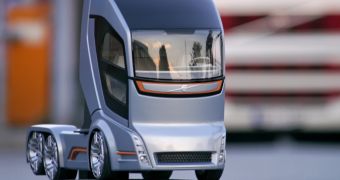The Swedes at Volvo Trucks ate using the EU-financed SARTRE (Safe Road Trains for the Environment) project to test systems that not only could eliminate the human factor in the transport sector, but also help lower climate impact.
The idea behind the project - of which Volvo is a part through its centre for research and innovation, Volvo Technology - is to develop a technology for vehicle platooning - that is, a convoy where a professional driver in a lead vehicle drives a line of other vehicles.
Each vehicle in the convoy measures the distance, speed and direction to the car in front, and adjusts accordingly. The vehicles are not physically attached to each other and can leave the procession at any time.
However, once in the platoon, the following drivers can relax and do other things while the platoon proceeds towards its destination under the expert guidance of the lead driver.
Platooning is expected to deliver a number of benefits: road safety will improve as the human factor is minimized. In addition to that, fuel consumption - and therefore also CO2 emissions - will be reduced by up to 20 percent.
Moreover, Volvo Trucks also claims that road congestion will be reduced as vehicles will be only a few metres apart, and the drivers of the following vehicles will be able to rest, work or eat.
"SARTRE is a very exciting project with future potential for saving fuel and improving traffic safety," stated Carl Johan Almqvist, Traffic and Product Safety Director at Volvo Trucks.
"Platooning offers the prospect of improved road safety, better road space utilisation, improved driver comfort on long journeys as well as reduced fuel consumption and hence lower CO2 emissions. With the combined skills of its participating companies, SARTRE is making tangible progress towards the realisation of safe and effective road train technology," adds Ricardo UK Ltd's Tom Robinson, SARTRE project coordinator.
The technology has been successfully tested with one car following the lead vehicle. However, public acceptance and the relevant legislation may take a while longer.

 14 DAY TRIAL //
14 DAY TRIAL //